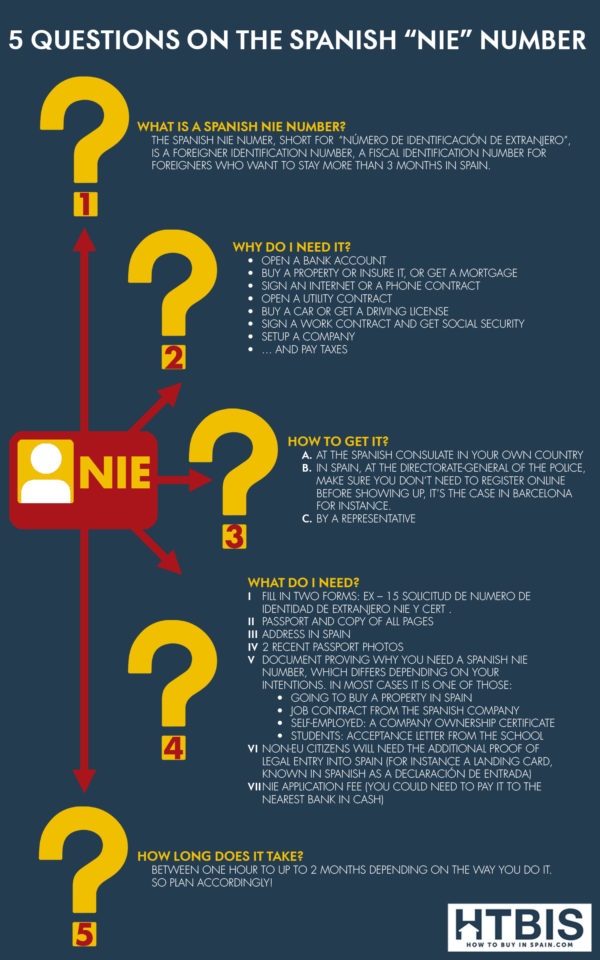
Unlocking Spain’s Secrets: A Guide to NIE Numbers
Spain is a country steeped in history, culture, and stunning landscapes that lure visitors from all over the world. For those planning to stay longer or even settle in this captivating Mediterranean nation, there are certain bureaucratic processes that must be navigated. One of the key requirements for residents and non-residents alike is obtaining a NIE number, an essential identification document in Spain.
So what exactly is a NIE number? The NIE, which stands for "Número de Identificación de Extranjero" in Spanish, translates to "Foreigner Identification Number" in English. This unique code is assigned by the Spanish authorities to individuals who undertake specific activities within the country, such as buying a property, starting a business, or working for an employer. Much more than just a bureaucratic formality, acquiring a NIE number is a crucial step in unlocking Spain’s secrets and becoming an integrated member of Spanish society.
To guide you through this process and shed light on the significance of a NIE number in Spain, we have prepared a comprehensive guide. From understanding the purpose and importance of having a NIE number, to detailing the step-by-step procedure for obtaining one, our aim is to simplify what may seem like a complex administrative task. Whether you are a tourist planning an extended stay, an expatriate settling down, or an international investor considering opportunities in Spain, this guide will provide you with the essential knowledge to navigate the NIE number system with ease.
Join us in this enlightening journey as we unlock the secrets of obtaining a NIE number in Spain, ensuring that you are well-equipped to embark on your Spanish adventure.
What is NIE Number in Spain?
The NIE Number in Spain, also known as the Número de Identificación de Extranjero, is a unique identification number assigned to non-Spanish residents. It serves as an official identification for foreigners living or conducting business in Spain.
This identification number is crucial for a wide range of activities, such as purchasing property, opening a bank account, obtaining a driver’s license, or even starting a business. Without an NIE Number, it can be challenging to navigate through various administrative processes in Spain.
Regardless of whether you are a student, a worker, or a retiree, obtaining an NIE Number is an essential step in ensuring your legal presence in Spain. It not only grants you access to various services but also enables the Spanish authorities to keep track of various aspects related to immigration and taxation.
Law firm
To acquire an NIE Number, individuals must submit the necessary documentation to the Spanish authorities responsible for issuing these identification numbers. This usually includes a valid passport, application forms, proof of residency, and any supporting documents related to the reason for obtaining the NIE Number.
Understanding what the NIE Number is and its significance in Spain is essential for anyone considering living or conducting business in the country. Once obtained, this identification number becomes a vital tool in unlocking various opportunities and fully enjoying everything that Spain has to offer.
Why do you need an NIE Number in Spain?
Obtaining an NIE Number in Spain is essential for various important transactions and activities. This unique identification number, known as the Número de Identificación de Extranjero (NIE), serves as official identification for foreigners residing in or conducting business in Spain. Let’s delve into the reasons why having an NIE Number is necessary.
First and foremost, an NIE Number is required for any legal or financial interactions you may have in Spain. From opening a bank account and buying property to starting a business or filing taxes, this identification number is crucial for ensuring smooth and legitimate transactions. Without an NIE Number, you may encounter significant difficulties or even face limitations when trying to engage in official matters.
Additionally, the NIE Number plays a vital role in accessing public services and benefits. It enables you to apply for healthcare, social security, and other government services, ensuring you receive the necessary support and assistance during your stay in Spain. Whether you plan to study, work, or retire in Spain, having an NIE Number gives you access to essential public resources.
Moreover, an NIE Number is often required for employment purposes. If you wish to work legally in Spain, whether as an employee or a self-employed individual, you will need this identification number. Employers, both in the private and public sectors, require the NIE Number to properly register employees, ensuring compliance with legal and tax obligations. Therefore, having an NIE Number becomes a prerequisite for accessing employment opportunities.
In conclusion, obtaining an NIE Number is crucial for a variety of reasons. It allows you to engage in legal and financial transactions, access public services and benefits, and pursue employment opportunities in Spain. Understanding why you need an NIE Number will enable you to navigate the necessary processes and fully enjoy your time in this vibrant country.
How to obtain an NIE Number in Spain
To obtain an NIE Number in Spain, foreigners must follow a few necessary steps:
Schedule an appointment: The first step in obtaining an NIE Number is to schedule an appointment at the Foreigners’ Office (Oficina de Extranjeros) or the National Police Station (Comisaría de Policía). It is important to note that some regions in Spain may require an appointment to be made online, so be sure to check the specific requirements in your area.
Complete the application form: Prior to your appointment, you must complete the application form known as the EX-15. This form is available online or can be obtained in person at the corresponding office. The information requested includes personal details, the purpose of the NIE Number, and your current address in Spain.

Bring the required documents: On the day of your appointment, make sure to bring all the necessary documents. These typically include your passport (original and a photocopy), proof of payment of the application fee (Modelo 790) – which can be obtained from a local bank or the Tax Agency -, two passport-sized photographs, and any additional documents that may be requested depending on your circumstances (e.g., employment contract, educational certificates, etc.).
Once you have completed these steps and submitted your application, the authorities will process your request for an NIE Number. The processing time may vary depending on the demand and location, but typically takes up to several weeks. Remember to keep your receipt or any documentation provided during the process, as it may be required for future procedures or transactions within Spain.
With your NIE Number in hand, you will have responsibly completed an essential requirement for living and working in Spain. Embrace the opportunity to explore and uncover the beautiful secrets this country has to offer!




